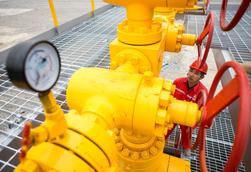 A Sinopec technician inspects shale gas facilities in Chongqing. (PHOTO / XINHUA)
A Sinopec technician inspects shale gas facilities in Chongqing. (PHOTO / XINHUA)
China is likely to include shale oil exploration and development during the 14th Five-Year Plan period (2021-25) to cut its reliance on costly imports and bolster energy security, experts said.
Speakers at a recent shale oil exploration and development promotion conference held by the National Energy Administration indicated that the government was keen to include shale oil exploration in the top-level policy blueprint that plots the country's path based on a set of developmental goals.
The move to include shale oil exploration and development in the 14th Five-Year Plan shows China's commitment to further enhance energy security, said Li Ziyue, an analyst with BloombergNEF
Shale oil exploration has the potential to accelerate development and the industry should focus on key issues like scientific and technological innovation, deepening research on basic geological theories and tackling key problems of related new technologies and equipment. Local governments should be encouraged to enact policies for the healthy development of the shale oil industry, accelerate exploration and drive innovation, the conference said.
Energy security has become an important item on the agenda as rising imports have prompted the government to look at ramping up domestic production of unconventional energy resources like shale oil.
The move to include shale oil exploration and development in the 14th Five-Year Plan shows China's commitment to further enhance energy security, said Li Ziyue, an analyst with BloombergNEF.
"As conventional oil production plateaus in China, China's reliance on crude oil imports will inevitably increase, especially if there are no unconventional resources such as shale oil," she said.
ALSO READ: Steady shale gas bolsters China's clean energy
"By including shale oil in the political agenda, the government is also expecting to attract more participation from private enterprises. Currently, most of the shale oil developments are being spearheaded by the State-owned oil majors like China National Petroleum Corp, China Petroleum & Chemical Corp or Sinopec and China National Offshore Oil Corp."
Following such development, companies that provide oilfield-related services, such as Offshore Oil Engineering Co Ltd, a company controlled by CNOOC, and Tong Petrotech, saw their share prices surge in Shanghai. Offshore Oil shares rose by 0.94 percent to 4.28 yuan (US$66 cents) on Wednesday, while Tong Petrotech went up by 2.52 percent to 3.26 yuan.
Chinese oil companies have so far identified over 50 billion barrels of shale oil resources in the major conventional oil-producing basins, global energy consultancy Wood Mackenzie said in a recent report.
Li from Bloomberg believes that a more diverse and competitive corporate environment would spur the development of the shale oil industry in China.
China's first successful shale oil well was drilled in the Xinjiang Uygur autonomous region in 2011.The Xinjiang branch of CNPC said it has drilled 47 wells in the Jimsar shale oil reservoir, containing about 1 billion tons of oil, with eight wells already completed.
According to the company's development plan released earlier, the Jimsar shale oil reservoir will produce 1 million tons of crude oil in 2021, and 2 million metric tons in 2025 and maintain stable production for nine years.
Unconventional oil output accounts for less than 1 percent of China's crude output, due to its high break-even and noncommercial economics despite the large volume, said Wood McKenzie.
Shale formations in China are more heterogenous, deeper and harder to extract due to the higher costs involved, it said.
Despite the challenges and high costs, State-owned oil companies will not stop focusing on shale oil as it provides an ideal opportunity to expand their domestic presence, said Angus Rodger, an analyst from Wood Mackenzie, earlier.
READ MORE: Sinopec to boost Tianjin portfolio with US$10.7b
Local governments and oil companies have been urged to increase oil and gas output this year, considering that China's energy import bill has been going up steadily. The country's dependence on imported crude is expected to reach 73 percent during the 2021-25 period.


